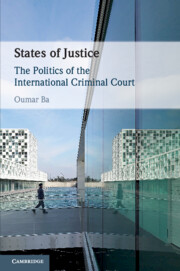Book contents
- States of Justice
- States of Justice
- Copyright page
- Dedication
- Contents
- Tables
- Acknowledgments
- Abbreviations
- 1 Regimes of International Criminal Justice
- 2 States of Justice
- 3 Outsourcing Justice
- 4 The International Politics of Justice
- 5 The Limits of State Cooperation
- 6 The Court Is the Political Arena
- 7 International Justice in a World of States
- References
- Index
4 - The International Politics of Justice
Published online by Cambridge University Press: 02 June 2020
- States of Justice
- States of Justice
- Copyright page
- Dedication
- Contents
- Tables
- Acknowledgments
- Abbreviations
- 1 Regimes of International Criminal Justice
- 2 States of Justice
- 3 Outsourcing Justice
- 4 The International Politics of Justice
- 5 The Limits of State Cooperation
- 6 The Court Is the Political Arena
- 7 International Justice in a World of States
- References
- Index
Summary
Chapter 4 describes the inherently political character of international justice and shows the working paradox between the UNSC and the ICC. The UNSC is the institution that allows the ICC to gain jurisdiction over states that have not ratified the Rome Statute, and this chapter asks whether international treaties such as the Rome Statute apply to states who are not signatories. The example of Libya is studied in detail to highlight the ways in which a non-ICC member chose to engage the Court by introducing an admissibility challenge and how the Court’s response to the challenge showed the inconsistency of its ruling, which also brings back the political dimension of international justice.
Keywords
- Type
- Chapter
- Information
- States of JusticeThe Politics of the International Criminal Court, pp. 65 - 87Publisher: Cambridge University PressPrint publication year: 2020

